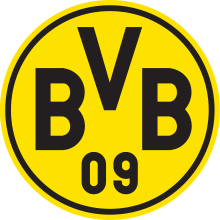Borussia Dortmund club focus

Football in late 19th Century Germany was dominated by the rich teams from the South of Germany and those based in Berlin, Borussia Dortmund or Ballspielverein Borussia 09 e.V. Dortmund to give them their full name were of a different breed. Originally German teams had been founded by rich middle class fans of the sport and were part of bigger sports clubs. The letter 'T' for example in many teams stands for the German gymnastics term 'Turnen'. Borussia though were part of the industrial Rhine's working class fascination at the turn of the century, as workers flocked to the mines in the area. If we look at Borussia's full name Ballspielverein (which gives us the BV on the badge) stands for Ball sports club. The name Borussia is the neo-Latin name for Prussia. Many of the clubs in Germany have pretentious names like this, due to the rich educated men who formed them, in Dortmund's case though it was because the founders met in a pub selling Borussia beer. The 09 stands for the year they were formed and e.V. is in most teams to show they are a non for profit organisation (ha ha).
In their early years Borussia Dortmund only met with moderate success. They were quite often in the shadows of their then more illustrious neighbours and now deadliest enemies Shalke, who dominated German football in the inter war years. Their first appearance in a national league final was 1949, when they lost 3-2 to Mannheim in the final. This was at time when Germany didn't have a national league and between 1946 and 1962 - the Bundesliga was founded in 1963- they played in the all powerful Oberliga West. During this period Dortmund won the championship in 1956 and 1957 as well as the final German Championship in 1963. The 1957 game has especially gone down in folkelore with Dortmund beating Hamburg 4-1. The three Alfreds of the team (Alfred Preißler, Alfred Kelbassa and Alfred Niepieklo) are still legends in Dortmund.
Dortmund's next piece of glory came in 1965 when they won the DFB Pokal Cup (German FA Cup). The following year they won the Cup Winner's Cup beating Liverpool 2-1 in the final. It was to be a bitter-sweet year though, as at they would have been crowned champions, if it hadn't lost four of their last five games. In the end they were caught by Munich 1860, who's hero Konietzka had recently joined the Munich club from you guessed it, Dortmund.
Despite moving to the impressive Westfalenstadion in 1972, the 1970's and 1980's were barren spells for the BVB boys. Financial problems and poor performances on the pitch went hand in hand. As the 80's started to turn into the 90's though things started to change for the better. In 1989 Dortmund beat Werder Bremen 4-1 in the cup final and then went on to beat Bayern Munich in the Super Cup. This was a sign of things to come, as the 1990s are generally seen as a golden era for Borussia Dortmund.
The real turning point was in 1991 when Ottmar Hitzfield took charge of the team. In 1992 Dortmund finished second, narrowly losing out to Stuttgart. The following season they finished fourth and made it to the UEFA Cup final. Despite losing 6-1 on aggregate to Juventus in the final, they still found themselves DM 25 million better off, and for once Borussia had cash to burn! one of the most impressive signings that they used the cash for was sweeper Matthias Sammer, who returned to Germany from Inter to sign for BVB. Dortmund went on to win the league and Super Cup in 1995 and 1996 and Sammer also picked up European footballer of the year in 1996.
There was yet more3 to come the following year though. Dortmund reached the final of the Champions League and as fate would have it the game was held in Munich against the team who had humiliated them in the UEFA Cup final, Juventus. Dortmund went on to win 3-1 in a game that saw Paul Lambert mark Zinedine Zidane out of the match.
At the start of the 21st Century Borussia became the first and still only German club to be floated on the stock exchange. It didn't seem to propel them forward though, as the early part of the century was another barren period for the team in black and yellow.
The charismatic Jurgen Klopp took over as the noughties drew to a close and his first act was to get Dortmund in the UEFA Cup in 2010, with the club narrowly missing out on the Champions League. The following year Klopp had assembled a young and hungry squad that went on to win the Bundesliga and drew them equal on seven titles with rivals Shalke.
In 2012 the yellow machine continued its onwards march, this time securing the double, but there was another development on the horizon. As well as the Spanish and English vultures circling the Westfalenstadion were Bayern Munich who have embarked on a spending spree since then, most of the time trying to pick off Dortmund's talent. In 2013 BVB finished second to the Bavarians and also lost in the Champions League final to them. Last season Dortmund came second to Bayern again, but the gap was bigger. Dortmund, this season have started poorly, mainly due to injuries and despite a decent start in the Champions League they seem to be already too far behind Bayern to catch them. Let's hope they can turn things round quickly and a win against Hannover when we are in town would be nice too.



Comments